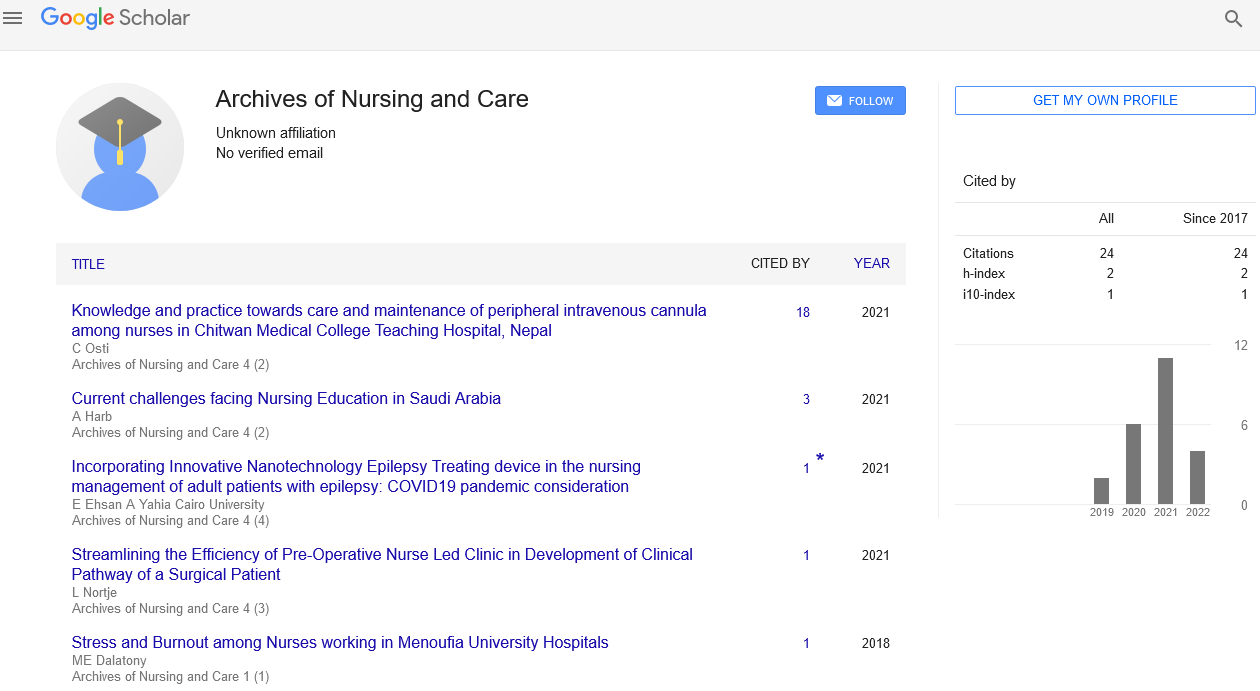Mini Review - Archives of Nursing and Care (2023) Volume 6, Issue 4
Empowering Nursing Students: Unraveling the Obstacles to Motivation in Clinical Education
Nazrul Islam*
Department of Nursing, University of Medical Sciences, Shiraz, Iran
Department of Nursing, University of Medical Sciences, Shiraz, Iran
E-mail: Islamnaz01130@gmail.com
Received: 02-Aug-2023, Manuscript No. oanc-23-102714; Editor assigned: 04-Aug-2023, PreQC No. oanc-23- 102714 (PQ); Reviewed: 18-Aug- 2023, QC No. oanc-23-102714; Revised: 24-Aug-2023, Manuscript No. oanc-23-102714 (R); Published: 30-Aug-2023; DOI: 10.37532/ oanc.2023.6(4).112-114
Abstract
Motivating nursing students during their clinical education is a critical aspect of nursing education. However, understanding the challenges faced by educators and students in this context is essential for the development of effective strategies to enhance motivation. This grounded theory study aims to explore the nursing challenges encountered in motivating nursing students during their clinical education. The study utilized a qualitative research design, employing semi-structured interviews with nursing educators and students in various clinical settings. The interviews were audio-recorded, transcribed, and subjected to rigorous analysis using grounded theory methodology. Theoretical sampling was employed until data saturation was achieved, ensuring comprehensive coverage of participants' perspectives.
The findings revealed several key challenges that hindered the motivation of nursing students during clinical education. These challenges included limited autonomy and decision-making opportunities, overwhelming workload and time constraints, lack of positive role models, inadequate feedback and recognition, and emotional stress and burnout. These challenges were interconnected, forming a complex web of factors that influenced student motivation. Based on the analysis of the challenges, the study proposed a theoretical framework highlighting the importance of student-centered approaches, mentorship programs, constructive feedback mechanisms, and support systems to enhance student motivation during clinical education. This framework emphasized the need for collaborative efforts between nursing educators, clinical preceptors, and healthcare institutions to address these challenges effectively.
Introduction
Nursing education plays a crucial role in shaping the future of healthcare professionals. Clinical education, which provides students with hands-on experience in real healthcare settings, is an essential component of nursing training. However, motivating nursing students during their clinical education poses several challenges. Aspiring nurses face numerous obstacles that can impact their motivation and hinder their learning experience [1]. In this article, we will explore some of the common challenges faced in motivating nursing students through clinical education and discuss potential strategies to overcome them.
Lack of confidence
One of the primary challenges nursing students encounter during clinical education is a lack of confidence. The transition from theory-based learning to actual patient care can be overwhelming, leading to self-doubt and anxiety. This lack of confidence can hinder students' motivation to actively participate in clinical activities [2]. To address this challenge, nursing educators can implement strategies such as pre-clinical simulations, role-playing exercises, and debriefing sessions. These activities help students build their confidence, enhance their clinical skills, and provide a safe environment to make mistakes and learn from them.
Limited exposure to diverse clinical experiences
Another significant challenge is the limited exposure nursing students have to diverse clinical experiences. In some instances, students may spend a significant amount of time in one specialty area, leading to a narrow perspective of the nursing profession [3]. This limited exposure can result in decreased motivation, as students may struggle to see the broader scope of their future roles.
To address this challenge, nursing programs can incorporate rotations in different healthcare settings, including hospitals, clinics, community centers, and long-term care facilities. Exposing students to a variety of clinical experiences broadens their understanding of nursing practice, encourages exploration of different specialties, and helps them develop a holistic perspective on patient care [4, 5].
Heavy workload and time constraints
Nursing students often face a heavy workload, including coursework, assignments, and clinical shifts. This demanding schedule can lead to fatigue, stress, and a lack of motivation. Balancing academic responsibilities with clinical demands becomes a challenging task, potentially affecting students' ability to engage actively and remain motivated during clinical education [6, 7].
To address this challenge, nursing educators can ensure effective time management by providing students with clear expectations, structured schedules, and realistic workload distribution. Additionally, fostering a supportive learning environment and encouraging open communication can help students cope with the demands of their nursing education and reduce the associated stress [8].
Limited mentorship and role modeling
Effective mentorship and positive role modeling have a profound impact on nursing students' motivation and professional development. However, limited access to experienced mentors and role models can pose a challenge in clinical education [9]. Without proper guidance and mentorship, students may struggle to connect theoretical knowledge to real-world patient care, impacting their motivation and confidence.
To tackle this challenge, nursing programs can implement mentorship programs, pairing each student with an experienced nurse or preceptor. Regular one-on-one meetings, shadowing opportunities, and constructive feedback sessions can provide invaluable support and guidance to nursing students [10]. Additionally, organizing guest lectures and inviting experienced nurses to share their career journeys can inspire and motivate students to pursue excellence in their nursing practice.
Conclusion
Motivating nursing students through clinical education is essential for their professional growth and the delivery of quality patient care. By addressing common challenges such as lack of confidence, limited exposure to diverse clinical experiences, heavy workloads, and limited mentorship, nursing educators can create an environment that fosters student engagement and motivation. Implementing strategies to enhance confidence, broaden clinical experiences, manage workloads, and provide mentorship will empower nursing students to overcome challenges and thrive in their clinical education journey. Ultimately, this will contribute to the development of competent and motivated nursing professionals who can meet the evolving needs of the healthcare industry.
References
- Chang RL, Deen WM, Robertson CRet al.Permselectivity of the glomerular capillary wall: III. Restricted transport of polyanions.Kidney Int.8, 212-218 (1975).
- Takakura Y, Fujita T, Hashida Met al.Disposition characteristics ofmacromoleculesin tumor-bearing mice.Pharm Res.7, 339-346(1990).
- Yamamoto Y, Tsutsumi Y, Yoshioka Yet al.Site-specific PEGylation of a lysine-deficient TNF-alpha with full bioactivity.Nat Biotechnol.21, 546-552(2003).
- Kaneda Y, Kamada H, Yamamoto Yet al.The use of PVP as a polymeric carrier to improve the plasma half-life of drugs.Biomaterials.25, 3259-3266(2004).
- Tsunoda S, Kamada H, Yamamoto Yet al.Molecular design of polyvinylpyrrolidone-conjugated interleukin-6 for enhancement of in vivo thrombopoietic activity in mice.J Control Release68, 335-341(2000).
- Norouzinia R, Aghabarari M, Kohan Met al.Health promotion behaviors and its correlation withanxietyand some students’demographic factors of Alborz University of Medical Sciences.Journal ofHealthPromotion Management. 2(4), 39- 49(2013).
- Pierce C.Health promoting behaviors of rural women with heart failure.Online Journal of RuralNursingandHealthCare. 5(2), 28-37(2005).
- Fayazbakhsh A, Khajeh KR, Soleymani NMet al.The Internet Using and Health: Students’knowledge, Attitude and Lifestyle Related to the Internet.Hakim Research Journal. 14(2), 96-105(2011).
- Chiou ST, Chiang JH, Huang Net al.Health behaviors and participation inhealthpromotion activities among hospital staff: which occupational group performs better?BMCHealthServ Res. 14(1), 474 (2014).
- Evangelista LS, Shinnick MA.What do we know about adherence and self-care?J Cardiovasc Nurs. 23, 250-257(2008).
Indexed at, Google Scholar, Crossref
Indexed at, Google Scholar, Crossref
Indexed at, Google Scholar, Crossref
Indexed at, Google Scholar, Crossref
Indexed at, Google Scholar, Crossref
Indexed at, Google Scholar, Crossref
Indexed at, Google Scholar, Crossref

